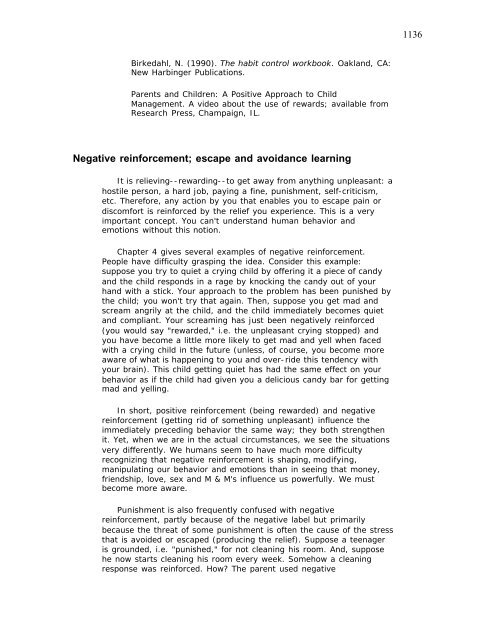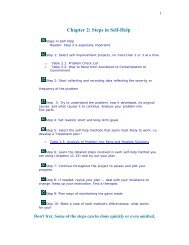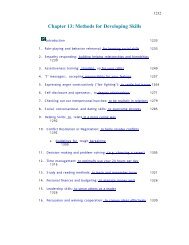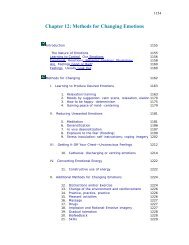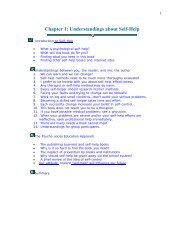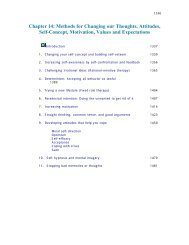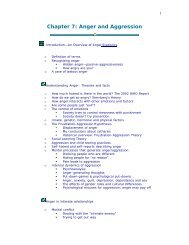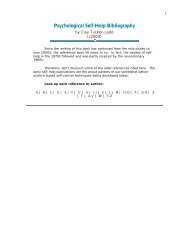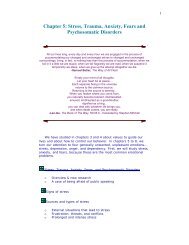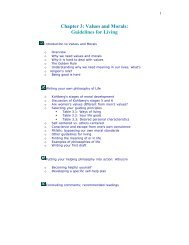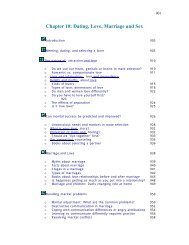Methods for Changing Behaviors - Psychological Self-Help
Methods for Changing Behaviors - Psychological Self-Help
Methods for Changing Behaviors - Psychological Self-Help
You also want an ePaper? Increase the reach of your titles
YUMPU automatically turns print PDFs into web optimized ePapers that Google loves.
Birkedahl, N. (1990). The habit control workbook. Oakland, CA:<br />
New Harbinger Publications.<br />
Parents and Children: A Positive Approach to Child<br />
Management. A video about the use of rewards; available from<br />
Research Press, Champaign, IL.<br />
Negative rein<strong>for</strong>cement; escape and avoidance learning<br />
It is relieving--rewarding--to get away from anything unpleasant: a<br />
hostile person, a hard job, paying a fine, punishment, self-criticism,<br />
etc. There<strong>for</strong>e, any action by you that enables you to escape pain or<br />
discom<strong>for</strong>t is rein<strong>for</strong>ced by the relief you experience. This is a very<br />
important concept. You can't understand human behavior and<br />
emotions without this notion.<br />
Chapter 4 gives several examples of negative rein<strong>for</strong>cement.<br />
People have difficulty grasping the idea. Consider this example:<br />
suppose you try to quiet a crying child by offering it a piece of candy<br />
and the child responds in a rage by knocking the candy out of your<br />
hand with a stick. Your approach to the problem has been punished by<br />
the child; you won't try that again. Then, suppose you get mad and<br />
scream angrily at the child, and the child immediately becomes quiet<br />
and compliant. Your screaming has just been negatively rein<strong>for</strong>ced<br />
(you would say "rewarded," i.e. the unpleasant crying stopped) and<br />
you have become a little more likely to get mad and yell when faced<br />
with a crying child in the future (unless, of course, you become more<br />
aware of what is happening to you and over-ride this tendency with<br />
your brain). This child getting quiet has had the same effect on your<br />
behavior as if the child had given you a delicious candy bar <strong>for</strong> getting<br />
mad and yelling.<br />
In short, positive rein<strong>for</strong>cement (being rewarded) and negative<br />
rein<strong>for</strong>cement (getting rid of something unpleasant) influence the<br />
immediately preceding behavior the same way; they both strengthen<br />
it. Yet, when we are in the actual circumstances, we see the situations<br />
very differently. We humans seem to have much more difficulty<br />
recognizing that negative rein<strong>for</strong>cement is shaping, modifying,<br />
manipulating our behavior and emotions than in seeing that money,<br />
friendship, love, sex and M & M's influence us powerfully. We must<br />
become more aware.<br />
Punishment is also frequently confused with negative<br />
rein<strong>for</strong>cement, partly because of the negative label but primarily<br />
because the threat of some punishment is often the cause of the stress<br />
that is avoided or escaped (producing the relief). Suppose a teenager<br />
is grounded, i.e. "punished," <strong>for</strong> not cleaning his room. And, suppose<br />
he now starts cleaning his room every week. Somehow a cleaning<br />
response was rein<strong>for</strong>ced. How? The parent used negative<br />
1136


